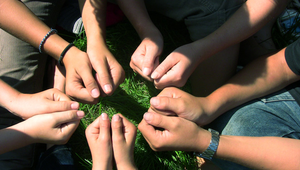“At the basis of a healed life there is trust. No deeper vision exists than the vision of a world in which there is trust between all beings.” (Quote from ‘manifesto for the youth of the world´ by Dieter Duhm, 2011)
Kids love communal life. The tribe has been seen historically as the original home of man. The family is the nucleus of the child’s world and a kid loves his or her parents above all things. When the family is again embedded in a higher social order, there is a protective container in which the love of parents can thrive and in which children and adolescents can grow up freely. Here they find comfort and absolute trust in the world of the adults.
‘It takes a whole village to raise a child’ (Sobunfo Some – African proverb).
These stable, village-like structures have dwindled in the course of social individualization and the globalization of the economy. Young people in particular are drawn away to urban regions in order to survive economically. At the same time there is a global movement in which an increasing number of people are joining community projects with the aim of building more stable and complex social systems. Many of these groups link into international networks such as the Global Ecovillage Network (GEN)
A school community of parents, teachers and students can contribute to the task of school development and school organization to make a region stronger. The regional networking of neighboring schools will reinforce this process.
We define the Escola da Esperança as a ‘school of life’ or ‘community school’; its social structure is based on the community’s way of living. Pupils learn mostly in mixed-age learning groups which offer lived experiences of mutual acceptance and support. At times all the school’s children and teachers take part in the ‘theatre school’ or ‘travelling school’ projects. Here they learn to resolve conflicts with each other in solidarity and experience how efficient it is to cooperate. By taking on age-appropriate responsibilities for the projects they learn the basic democratic principles of life.


